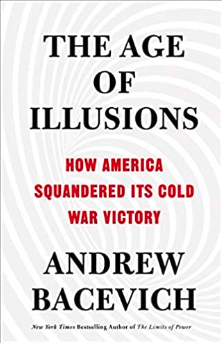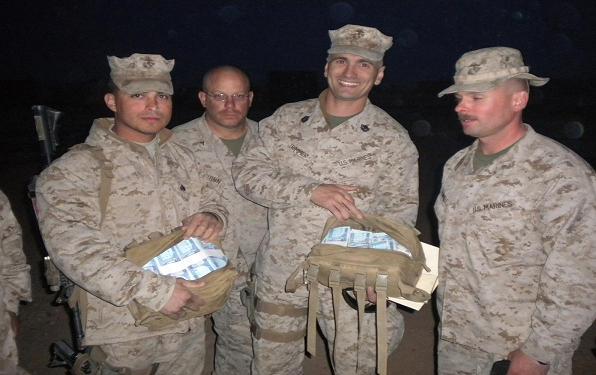W.J. Astore
I came across this quotation yesterday: “I am worried about the state of the readiness of the nuclear triad,” Deputy SecDef nominee Kath Hicks tells the Senate Armed Services Committee this morning, “and, if confirmed, that is an area I would want to get my team in place and start to look at right away.”
The U.S. military plans to spend well over a trillion dollars over the next thirty years to “modernize” the nuclear triad of land-based ICBMs, nuclear-capable bombers, and sub-launched ballistic missiles. Long ago, I remember reading (from December 1982) that Charles Bennet, a Democratic Congressman, had said “The triad is not the Trinity.” But the Pentagon treats it as if it is a (un)Holy Trinity, shoveling money to build even more nuclear weapons to devastate and destroy humanity. I don’t use the concept of evil lightly, but I can’t think of policies much more evil than developing yet more genocidal weaponry at enormous cost.
We desperately need new thinking in America, which is why I wrote the following article for TomDispatch. Maybe some of these are pipe dreams; then again, maybe we should all be smoking peace pipes more often.
The Power of America’s Example
When it comes to war, if personnel is policy, America is yet again in deep trouble.
As retired Army Major Danny Sjursen recently pointed out at TomDispatch, when it comes to foreign policy, President Joe Biden’s new cabinet and advisers are well stocked with retired generals, reconstituted neocons, unapologetic hawks, and similar war enthusiasts. Biden himself has taken to asking God to protect the troops whenever he makes a major speech. (How about protecting them by bringing them home from our pointless wars?) “Defense” spending, as war spending is generally known in this country, remains at record levels at $740.5 billion for fiscal year 2021. Talk of a new cold war with Russia or China (or both) paradoxically warms Pentagon offices and corridors with yet more funds. The only visible dove of peace at Biden’s inaugural was the giant golden brooch worn by Lady Gaga. So what exactly is to be done?
Peace-driven progressive policies will not emerge easily from the rainbow kettle of hawks Biden has so far assembled, but his inaugural speech did mention leading and inspiring others globally “not merely by the example of our power but by the power of our example.” It would have been an apt rhetorical flourish indeed, if not for this country’s “forever wars” in Afghanistan, Iraq, Libya, Syria, Yemen, and elsewhere across the Greater Middle East and Africa. America’s harsh war-fighting reality suggests that “the example of our power” still remains standard operating procedure inside the Washington Beltway. How could this possibly be changed?
I have a few ideas for Biden — a 10-point plan, in fact, for turning his softball rhetoric into hardball reality. Consider, Mr. President, the following powerful examples you could set as America’s latest commander-in-chief:
1. Stop the U.S. from building new generations of nuclear weapons and downsize the vast existing American arsenal, while launching global negotiations to work toward the elimination of all such arsenals. The U.S. military is set to spend well over a trillion dollars in the coming decades to “modernize” its nuclear triad of bombers and land-based and submarine-launched missiles. Such a staggering “investment” can only move the world closer to nuclear Armageddon. If America is to lead by example when it comes to the ultimate power on this planet, why not begin by cancelling this trillion-dollar-nightmare as part of a new global anti-nuclear initiative? Why not commit us, long term, to the elimination of all nuclear weapons everywhere, while moving to adopt a “no-first-use” policy?
2. When it comes to President Biden’s commitment to slow climate change and clean up the environment, why not do something in military terms? America’s armed forces have an enormous appetite for fossil fuels. The Pentagon also has a sordid record when it comes to the poisoning of the environment. (Consider the legacy of Agent Orange in Vietnam, or the military’s burn pits in Iraq and Afghanistan, or the birth defects and severe health problems that were linked to the munitions its forces used in assaulting the Iraqi city of Fallujah in 2004.) If the president wants to set an example when it comes to demilitarizing this over-armed, over-polluted planet of ours, reducing both the military’s fossil-fuel emissions and its poisonous munitions would be a powerful way to start.
3. End this century’s forever wars and radically downsize this country’s unprecedented global network of military bases. Driving the colossal size of today’s military is what my old service, the Air Force, likes to call its “global reach, global power” mission. At least in theory, that mission, in turn, helps justify the sprawling network of 800 or so overseas bases, a network that costs more than $100 billion a year to maintain. Such bases not only consume resources needed here in the U.S. and help stoke those forever wars, but they present high-value targets to opponents and incite ill-feeling and resistance from “host” countries. So, downsizing that global base structure would be an act of peace — and fiscal sanity.
4. Make major cuts in the country’s war budget. Fewer bases and fewer or no wars should translate into a far lower defense budget. Somewhere in the neighborhood of $400 billion annually to defend this country and cover its real “national security” interests seems reasonable for the self-styled lone superpower. The money saved (roughly $340 billion based on this year’s budget) could then perhaps be partly rebated directly to American families in need in this pandemic. Perhaps every American family earning less than $50,000 a year could see a rebate on their taxes directly attributable to downsizing that budget and America’s imperial footprint overseas. Taking a page from Donald Trump, President Biden, as America’s thrifty and giving commander-in-chief, could even have his name put on those rebate checks. Call it a long-delayed peace dividend. Regular Americans, after all, need such “dividends” far more than giant defense contractors like Boeing or Raytheon. And don’t get me started on the need to invest in rebuilding this nation’s infrastructure at a moment when the extremities associated with climate change threaten to devastate parts of the country.
5. Create a Department of Peace (here’s looking at you, Dennis Kucinich) with influence at least approaching that of the so-called Department of Defense. Currently, the U.S. military is all about power projection, domination of the global battlespace, and similar buzzwords that add up to exporting violence abroad, special op by special op, drone by drone. You are what you do and the U.S. military does permanent war with plenty of “collateral damage.” (Picture mutilated black and brown bodies and flattened and poisoned cities and towns.) If the U.S. government can create a Space Force just to fulfill the fantasies of Donald Trump, then why not a peace force, too? (America’s current, humble Peace Corps asked for $401 million for Fiscal Year 2021, roughly the cost of four underperforming F-35 jet fighters.) Peace, much like war, doesn’t just happen. You have to work at it — and that would be precisely the mission of the Department of Peace.
6. Pay attention, for once, to President Dwight D. Eisenhower’s 1961 farewell address and exert rigorous oversight and zealous control over the military-industrial complex. That means ending the 2001 AUMF, the authorization for use of military force that Congress passed in a climate of panic and revenge in the immediate aftermath of 9/11 (though it was only to be against those associated in some fashion with those terror attacks), and the second one Congress authorized in 2002 in preparation for the Bush administration’s invasion of Iraq. They have been misused and abused by presidents ever since. Furthermore, end any conflict that hasn’t been authorized by a direct Congressional declaration of war. That means withdrawing all U.S. troops from Iraq, Afghanistan, Syria, and elsewhere across the Greater Middle East and Africa. America’s security is not, in fact, directly threatened by those countries. As a self-declared democracy, the United States should set an example by not fighting wars disconnected from the people’s will and the true needs of national defense.
7. And speaking of President Eisenhower, America needs to embrace his lesson that military spending represents a theft from Americans who are hungry, sick, and need help. For its “national security,” this country needs more hospitals, better education, safer food, a cleaner environment, and, most of all, clean water and fresh air. Eisenhower knew that warships and warplanes were simply not the answer to the American people’s real and pressing needs.
8. Reject threat inflation, including the heightening talk of a “new cold war” with Russia or China or of an ongoing “generational” war on terror. Eliminate talk of a new Red Menace, of likely wars with Iran or North Korea, or of America’s backwardness in cyberwarfare research and development. Terrorism is nothing new and will always be with us in one form or another (including, vis-a-vis the Capitol on January 6th, domestic terrorism). Indeed, since war is terror, a war on terror should truly be considered an oxymoron. Terrorist acts are mostly the recourse of the weak when taking on the strong. The United States isn’t going to stop them by getting stronger yet. Nor are China and Russia about to invade this country. (This isn’t Red Dawn.) Iran is not coming to impose Sharia law and North Korea is not about to launch nukes against us. As for cyber-attacks, don’t worry: no matter what you’ve heard, no country does cyberwarfare better than the U.S.A.
9. End the practice of foreign aid taking the form of military aid. When taxpayers give aid to foreign countries, it should be in the form of food, medicine, and other essentials, not cluster bombs, F-16s, and Hellfire missiles.
10. Learn from Abraham Lincoln. In President Biden’s recent Inaugural Address, as a call to national unity, he made reference to Lincoln’s initial inaugural appeal to “the better angels of our nature.” But he should have focused on Lincoln’s Second Inaugural Address, the finest speech ever given by any president. As Lincoln put it then, when it came to ending the American Civil War:
“With malice toward none; with charity for all; with firmness in the right, as God gives us to see the right, let us strive on to finish the work we are in; to bind up the nation’s wounds; to care for him who shall have borne the battle, and for his widow, and his orphan — to do all which may achieve and cherish a just, and lasting peace, among ourselves, and with all nations.”
Lincoln was unafraid of speaking of and seeking a just and lasting peace. In this century, until at least the Trump years, Americans often heard their leaders speak of this nation’s “exceptional” nature. What could be more exceptional, more laudable, than seeking a lasting global peace?
Biden, like me, is Roman Catholic. My Catholic bible (Matthew 5:9) tells me that Christ said, “Blessed are the peacemakers, for they shall be called children of God.” Instead of beseeching God to protect the troops that American presidents have continually sent into harm’s way, Joe Biden might ask for blessings for America’s peace activists. To echo Lincoln again, that would indeed be a case of right making might, instead of the might-making-right vision that a militaristic America has grown far too comfortable with.
An Alert and Knowledgeable Citizenry
So long ago, President Eisenhower spoke of the importance of having an “alert and knowledgeable citizenry.” Isn’t it time for mainstream media outlets to foster real, critical, investigative journalism that would truly inform those very citizens about America’s wanton military spending and endless wars, while providing educators with crucial material to teach their students about the horrific costs of militarism? This country needs to free its collective mind from the prevailing forever-war narrative. To paraphrase Crosby, Stills, and Nash, if we teach the children well, perhaps they won’t repeat their father’s hell.
In his song “Imagine,” John Lennon asked us all to imagine a different world and said that it’s easy if you try. Lennon got the first and most important part right, but the second part sadly doesn’t apply, at least to this country in this century. Nowadays, Americans are so immersed in a culture driven by war, profit, and exploitation that it’s no longer easy to imagine anything but war. If Americans truly paid attention to war, up close and as personal as they could get, they’d begin to grasp the folly and wickedness of it and so perhaps relinquish what I’ve come to think of as their prisoner-of-war mentality in relation to it. They might actually begin breaking down mental barriers to peace.

Don’t count on Congress doing it, though. Congress is incestuously part of what should be renamed the military-industrial-congressional complex. Don’t count on the military doing it either. Its most senior men and women have been carefully selected, groomed, and promoted because they believe in the system, which includes incessant lobbying for more weaponry and exaggerating the threats to this country to get it. They exist to wage war; the rest of us should be willing to fight for peace.
Change, if and when it comes, will have to be driven by people like us.
It won’t be easy, but it is necessary for America’s survival. And it’s unlikely to come without campaign finance reform and the public funding of elections. In a “pay-to-play” oligarchy disguised as a democracy, the giant weapons-making corporations simply pay much more than you do and so speak through megaphones, leaving you with a dead mic. Unless the corporate dominance of our politics is curtailed, ordinary Americans will continue to be outshouted and overwhelmed by the bellicose and the greedy, leaving the country forever at war.
It won’t be easy to work for peace, but it sure is worth the try. It sure as hell beats the alternative of guns, bombs, and missiles being produced like so many sausages in a militaristic country that ever more resembles George Orwell’s nightmarish image of the future as “a boot stamping on a human face — forever.”
America’s new president has called for us to lead with the power of our example rather than just the example of our power. I can’t think of anything more exemplary and powerful than a strong commitment to making war no more.
Copyright 2021 William J. Astore












